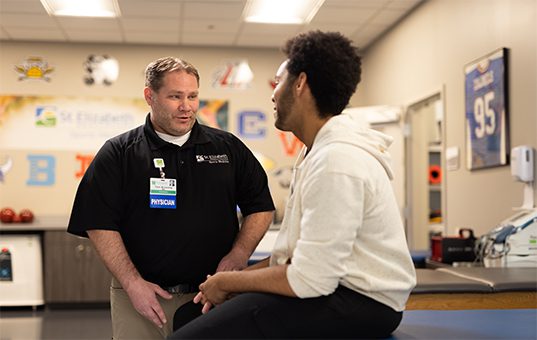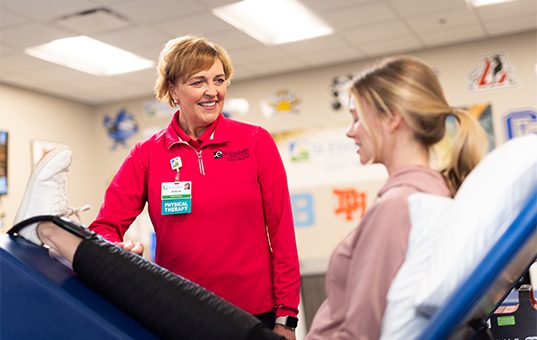Caregiver Resources
Caregivers are important members of the care team. After surgery, your encouragement, help and support will go a long way in helping your loved one recover.
When your loved one leaves the hospital, you’re not leaving support behind. We’re a phone call away when you have questions or if you just want to talk with someone who understands the ups and downs of recovering after surgery. We’re here to support you and your loved one every step of the way.
How You Can Help in the Hospital
Your loved one’s rehabilitation begins in the hospital shortly after knee replacement surgery. The day of surgery, a physical therapist or nurse should help them sit up in a chair or begin walking.
As the caregiver, you can help by:

Learn More
If surgery is necessary, our physicians can provide a referral to one of our affiliated orthopaedic surgeons. For more information on surgical options, please contact us at askortho@stelizabeth.com.
How You Can Help at Discharge
Transportation
When the orthopedic team discharges your loved one from the hospital, the next stop is either heading home or to a skilled nursing facility. You will be responsible for providing transportation to your loved one. They should be able to travel by car when discharged.
Medications
Your doctor will prescribe medicine and a blood thinner upon hospital discharge. These prescriptions should be filled immediately for use at home. If your loved one is heading to a skilled nursing facility first, medications will be provided at the facility.
Equipment
If your loved one is coming home to recover and rehabilitate, they will need equipment at home. This equipment can include:
- Assistive walking devices, such as a cane, crutches or a walker
- Ice packs
- Hand-held breathing device
- Pillows for elevation
- Some surgeons suggest using a Continuous Passive Motion Machine (CPM) at home – check with the surgeon to see if a CPM is a good fit for your loved one’s rehabilitation plan.
Before your family member leaves the hospital our orthopedic team will help to secure this equipment for home use. If they are headed to a skilled nursing facility, all necessary equipment will be provided for them at the facility.
How You Can Help at Home
Walk through the house before your loved one goes home from the hospital to see if there are issues that may make it hard or unsafe to make their way around the house. Using an assistive device, such as a walker, takes extra effort. Some things that can help make it easier for your loved one to get around on their own include:
Assistance
Your family member should be able to sit down and stand up from sitting and move around the house using an assistive device such as a walker. They will need help with tasks and activities such as meals, showering and dressing. Be sure to follow the instructions about how to care for your loved one’s incision.
Things to Watch For
Like any major surgery, hip replacement surgery comes with risks for issues such as infection, blood clots and pneumonia. There are signs of those complications you can watch for. Contact the physician if your family member:
- Has any changes in the appearance of the incision area
- Runs a fever 101° F or higher
- Calf pain, redness or swelling
- Complains of chest pain or shortness of breath
- Has any type of injury to the recovering hip or leg
Therapy & Exercise
Physical therapy and home exercise are important pieces in your loved one’s recovery. Closely following the physical therapist’s instructions will help to maximize their mobility and help with recovery time. To help make the most of physical therapy and home exercise:
Emotional Support
In addition to providing assistance to your loved one, your support and encouragement are also important pieces in their recovery. Even though they will be in pain from their knee replacement surgery, it’s important to encourage them to continue with their physical therapy and daily exercise routine. Help your family member work through any frustration and focus on the goals of healing and strengthening their knee. Your support and encouragement will make a big difference in their recovery.
Contact Us
Call
Total Joint Center Coordinator:
(859) 301-0405
St. Elizabeth Outpatient Physical Therapy:
(859) 301-2168
St. Elizabeth Care Coordination:
(859) 301-2275
Surgical Options
If surgery is necessary, our physicians can provide a referral to one of our affiliated orthopedic surgeons. For more information on surgical options, please contact us at askortho@stelizabeth.com.


